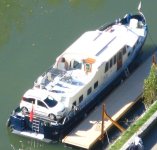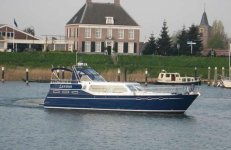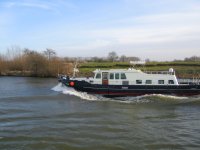Greenline are probably the most successful all-electric boat builders, though in practice all-electric is, for most owners who do their research first, a non-starter.
I'm a member of the Dutch Barge Association, an organisation that promotes boating in all types of boat (not just barges) on the inland waterways of Europe and the UK. The forum frequently features discussions on the subject of electric propulsion, but in practice I don't believe a single member has an all-electric vessel. The biggest trouble is charging though there are several others.
As one travels along the waterways of Europe, you stop overnight at some suitable mooring. This may be a central town quay, probably without a shore supply, or a marina that offers only 6 or 10 amps (at 220 volts), or you choose a quiet and beautiful spot in the middle of nowhere which will certainly have no power. The next day you have a flat battery, often even if moored on a marina if you do your cooking and / or run AC from the limited shore supply - there's little left to charge batteries and you are constantly feeding coins into the supply box – a very costly was of buying power!
I see the model you offer a link to is a hybrid design, so it has a proper engine that may directly drive the prop in tandem with an electric motor, or it may simply act as a generator to keep the batteries charged. Whichever way you choose, the cost is inevitably more and running costs are likely to be much the same, so little environmental friendliness!
For fully-electric even Greenline says “At 4-5 knots, a fully charged battery pack provides a range of up to 20 miles.” That’s no good. Electric propulsion is likely to offer something around 50 hp (the Greenline 45 has a Torqeedo 80i 50kW unit) and this is fine for cruising canals, but you're unlikely to make much progress against a fast-flowing river, or at least not for long. So do you get a bigger motor and huge battery pack for those few days, or just find an alternative route – often impossible? Or go hybrid?
With cars, a hybrid design works well as cars use full power for a matter of seconds at a time so a combined power of 150 hp is likely to offer acceptable performance and the engine will switch in and out as required by the state of the battery. In a boat, there are times when full power is needed for hours at a time – going up the Rhine, Waal, Rhone, etc. The battery will soon be exhausted so you rely entirely on the engine power for much of you day’s cruising – you need just as big an engine as your conventional diesel-engined boat. So what have you saved by hybrid? Nothing apart from hugely bigger installation cost and more complex control systems. OK for cars, but much less so for boats.
My boat is 50 ft in length and is has a 210 hp engine that offers all I need for plugging upstream or crossing the Channel. I carry enough fuel for an entire year of regular holidays – about 14 weeks continuous. I never need shore power as I have an 8 kw generator that is only occasionally needed. Simple and efficient – and economical at about 4 litres per hour.
If I was to go electric, I’d choose a big enough electric motor to power against river flow, a generator of similar power that is cocooned so as to be quiet and located anywhere suitable in the boat, and a big battery pack to absorb the generator’s output and (if fully charged) would satisfy all domestic needs if moored up for 3 or 4 days without power. No separate generator needed but it would still cost a great deal more than conventional installations.
There’s a lot to be said for a modern efficient diesel engine driving the prop with no attempt to go the complex electric route.





